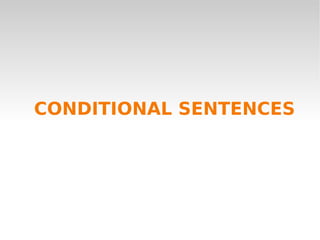
Conditional
- 2. CARACTERÍSTICAS ✿SON ORACIONES COMPUESTAS: TIENEN POR LO TANTO DOS VERBOS. ✿LA PROPOSICIÓN SUBORDINADA EXPRESA LA CONDICIÓN (CONDITIONAL CLAUSE) Y LA PRINCIPAL INDICA EL RESULTADO ( RESULT CLAUSE OR MAIN CLAUSE) ✿EXISTEN TRES TIPOS DE ORACIONES CONDICIONALES
- 3. PRIMERA CONDICIONAL ✿ EXPRESA QUÉ OCURRIRÁ SI SE CUMPLE LA CONDICIÓN SEÑALADA CONDITIONAL CLAUSE RESULT CLAUSE IF FUTURO (WILL + INFINITIVO) UNLESS (=IF NOT)+ PRESENTE SIMPLE IMPERATIVO MODAL + INFINITIVO (CAN, MUST...........) You will download the attached file if you click here Send Tina a text message if you want to contact her If the keyboard is broken, you can use the mouse You can't go out unless you finish your homework You can't go out if you don't finish your homework
- 4. SEGUNDA CONDICIONAL CONDITIONAL CLAUSE RESULT CLAUSE IF+ PASADO SIMPLE CONDICIONAL SIMPLE (WOULD + UNLESS INFINITIVO I'D) COULD, MIGHT (POSIBILIDAD AÚN MENOR) ✿ EXPRESAN CONDICIONES HIPOTÉTICAS RESPECTO AL PRESENTE,ESDECIR, ES POCO PROBABLE QUE OCURRAN ✿ SI EL VERBO DE LA ORACIÓN CONDICIONAL ES TO BE, SE USA WERE PARA TODAS LAS PERSONAS ✿ CON MIGHT Y COULD SE EXPRESA UNA POSIBILIDAD AÚN MÁS REMOTA IF I WERE A RICH PERSON, I WOULD BUY A FERRARY.
- 5. TERCERA CONDICIONAL ✿ En este tipo de condicionales, la condición es totalmente imposible, pues se refiere al pasado y ya no puede realizarse. If I had studied harder, I would have gone to the University If Jack had come, we could have eaten earlier CONDITIONAL CLAUSE RESULT CLAUSE IF+ PAST PERFECT CONDICIONAL COMPUESTO (WOULD UNLESS HAVE+ PARTICIPIO PASADO) COULD HAVE, MIGHT HAVE + PARTICIPI DE PASADO
- 6. Las oraciones temporales Las referidas al futuro se forman como las oraciones condicionales de primer tipo: Presente simple en la subordinada y futuro en la principal. Las conjunciones que suelen introducir este tipo de oraciones son: as soon as, by the time, the moment that, when....... She'll buy a car as soon as she passes her driving test.
